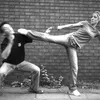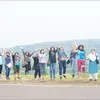Meet 27-year-old Abhishek Yadav from Uttar Pradesh who has trained over two lakh girls in self-defense
Abhishek Yadav, a multi-discipline martial artist, started the 'Meri Raksha Mere Haathon Mein' campaign to help people, especially women and girls across India to defend themselves.
In 2015, 26-year-old Karuna Tripathi was at a Dussehra festival fair along with her friends in Lucknow, visiting various stalls and having fun. On their way home, the girls were accosted by a group of five men who began harassing them.
Karuna took matters into her own hands and fought back. Thanks to her presence of mind and her training in self-defence under a programme called 'Meri Raksha Mere Haathon Mein' (My defence is in my hands), with a few martial art moves, she was able to ward off her harassers and save herself and her friends.
Like Karuna, around 2.5 lakh girls in Uttar Pradesh and across India have learnt the art of self-defence under the 'Meri Raksha Mere Haathon Mein' programme – an important achievement for women’s safety.

Abhishek Yadav along with the students during a training session
Leading this campaign is Abhishek Yadav, a 27-year-old multi-discipline martial arts expert, who has trained these girls and also two battalions of the Gorkha Force in Indian Army, besides taking self-defense classes for around 70,000 police personnel of the Maharashtra and UP Police.
A passion for martial arts
It wasn’t an easy task for Abhishek as his parents weren’t supportive of his passion for martial arts. While studying at a government school in Gorakhpur, Uttar Pradesh, he simultaneous trained at a nearby camp.
Speaking to SocialStory Abhishek says,
“My parents weren’t happy about me learning martial arts, for them it meant getting hurt and beaten up and without any real use. They wanted me to join the civil services and live a normal life instead.”
Abhishek did not compromise on getting an education and after completing Class XII, he applied for a Bachelor’s in Information Technology programme through distance education from Karnataka Open University (KoU).
Meanwhile, he also continued his training in martial arts and honed his skills in different forms like Aikido, Jitsu, and Karate.

Abhishek talking during one of his training session to the participants under his self-defense initiative
For training, he had to travel to different cities and his parents weren’t happy with that either. He only continue because of the support of his friends who understood and acknowledged his passion.
“I am thankful to my friends, who used to collect money for my trips and training expenditure. They always encouraged me to follow my passion and pledged their support. They said, ‘Keep learning, and don’t look book,’” he says.
Abhishek completed his training in six years and got a black belt in karate in 2006. He also continued his studies and enrolled for a Master’s in Information Technology through KoU, which he completed in 2009.
Enabling every individual to fight back
After Abhishek completed his training in 2006, he established the Abhiself Protection Trust, under which he initiated a programme called, “Meri Raksha Mere Haathon Mai”. In 2007, Abhishek started training police commandos in Uttar Pradesh in martial arts.
Once, when Abhishek hosted a camp at Madan Mohan Malaviya University, Gorakhpur, he didn’t receive a good response. Many wondered why learn martial arts. A few girls came to see what the camp was all about and he encouraged them to join. From 50 on the first day, the number of girls who joined increased to 2,000 on the second day of the camp.

Training the UP Police women personnel
Buoyed by the interest shown, Abhishek started training camps in schools. He began giving training to almost everyone, from police personnel, army personnel, and girls. With his expertise in most forms of martial arts, Abhishek developed his own technique called Special Commando Technique which he uses to train all his students as it is quite useful to train girls. Through this technique, a girl can just hold the single finger and control the entire body of the molester.
Abhishek explains the reason for the increased interest in women’s safety.
“The unfortunate Nirbhaya gang rape in 2012 shook the entire country. I was also shocked, but I also realised that my programme was a necessity for all girls and women out there. I wanted to make every individual strong enough to defend themselves in times of need.”
This was the beginning and there has been no turning back since then. Abhishek went on to train girls across various schools in and around Uttar Pradesh with his own money.
In 2015, Abhishek was awarded Yash Bharti Award, the youngest recipient to win what is often regarded as the highest civilian award given by the UP government. Along with the award, he also received Rs 11 lakh and Rs 50,000 per month as pension from the UP government.
He used the award money to organise more training camps and for his travelling needs.
All the camps set up by Abhishek are conducted over a week in colleges and schools and students are trained for two-and-a-half hours each day during the break. Around 1,000-2,000 girls turn up for each camp, and after completion, they receive a certificate from the trust and the school or college where the camp is organised.

Demonstrating the self defense techniques to the police personnel
Abhishek uses social media to spread awareness about his camps in various cities.
“We have a dedicated Facebook page and maintain a record of all the students we train and inform them through WhatsApp about upcoming training camps. Most of the times, it happens through the word of mouth because when girls receive confidence through training, they also tell others about the session and why it’s necessary for them to enrol as well.”
The impact, he says, is quite visible.
“There are many instances where girls have been able to defend themselves. Many local goons used to harass college girls, but after attending our training sessions, I hear that the same students are now beating up those goons and standing up against them. Also, there was an incident of chain snatching, where the girl not only resisted but also fought back and saved herself.”
It was also a matter of great honour for Abhishek when it made it to the Limca Book of World Records for training 5,700 girls in self-defense techniques along with Jagadguru Kripalu Parishat in 2017. Most of these girls were from rural areas of Uttar Pradesh and this impressive number broke the record of East Delhi Police and the Delhi government, which had trained 5,000 girls in self-defense.
Witnessing Abhishek’s hard work and determination, and also his success, his parents started appreciating and supporting his work in the field of women’s safety.
The road ahead
Anyone can join Abhishek’s self-defense training programmes, irrespective of age. He has even trained a group called Power Wing that comprises 50 women above the age of 45.
At present, Abhishek has a team of 14 members, former students who help him in his campaign. He enlists their help when there is a need train around 1,000-2,000 girls.

Abhishek is all set to break his own record in Mumbai this year in December. He will be training around 21,000 girls together in Thane, Mumbai, that will include 11,000 trainee cadets for the sub-Inspector post, Maharashtra Police and 10,000 college students.
About his future plans, Abhishek says,
“Our mission is to train every individual to the extent where they can defend themselves.”
(Edited by Rekha Balakrishnan)









